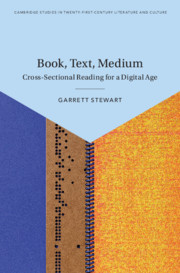Book contents
- Book, Text, Medium
- Cambridge Studies in Twenty-First-Century Literature and Culture
- Book, Text, Medium
- Copyright page
- Dedication
- Contents
- Figures
- Prospectus
- Intro\Retro
- Part I The Hold of the Codex
- Part II The Grip of Inscription
- Part III The Give of Medium
- Chapter 5 Phrasing the Sayable
- Chapter 6 Between Language and Text
- Parting Words
- Notes
- Index
Chapter 6 - Between Language and Text
from Part III - The Give of Medium
Published online by Cambridge University Press: 21 December 2020
- Book, Text, Medium
- Cambridge Studies in Twenty-First-Century Literature and Culture
- Book, Text, Medium
- Copyright page
- Dedication
- Contents
- Figures
- Prospectus
- Intro\Retro
- Part I The Hold of the Codex
- Part II The Grip of Inscription
- Part III The Give of Medium
- Chapter 5 Phrasing the Sayable
- Chapter 6 Between Language and Text
- Parting Words
- Notes
- Index
Summary
Rounding out the previous chapter’s treatment of Victorian narrative with the early modernist prose of Henry James, analysis returns to the ontology of language in Agamben, leading on to a more philologically oriented history of prose – pivoted on the Enlightenment rise of the “plain style” – in research by John Guillory. Such is a mode of discourse whose potential stranglehold on future developments in literary writing is contrasted with a recovered premium on the densities of rhythm and sonority. Literary examples extend from Whitman’s insurgent lexical poetics, through D. H. Lawrence’s grammatically impacted style, to the stripped-down phrasal ironies of Kazuo Ishiguro – before returning to Friedrich Kittler on the ideologies of speech as medium in the post-Enlightenment century. Discussion closes with an adapted Heideggerian model for the present-at-handness of language itself in medial disclosure – rather than just in scriptive use.
Keywords
- Type
- Chapter
- Information
- Book, Text, MediumCross-Sectional Reading for a Digital Age, pp. 173 - 214Publisher: Cambridge University PressPrint publication year: 2021

